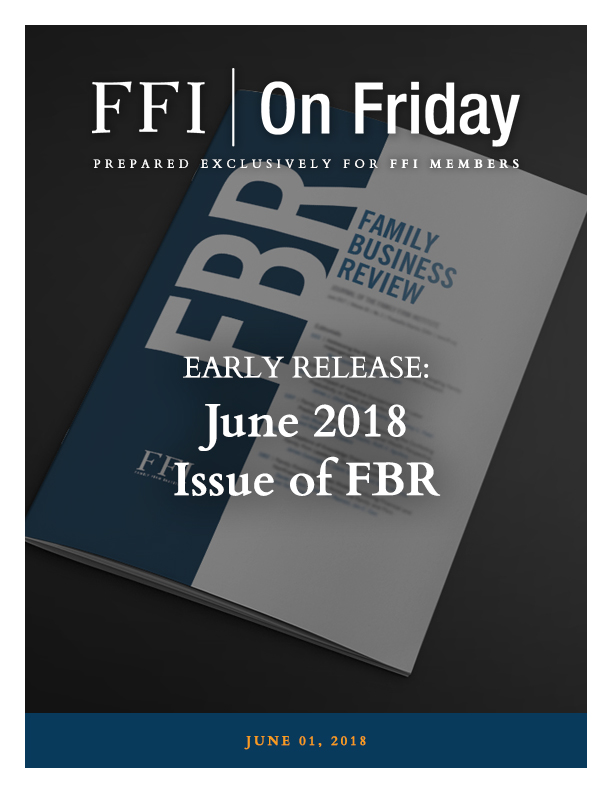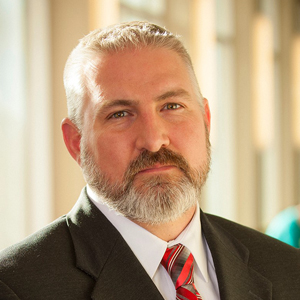FFI On Friday | June 01, 2018
Prepared Exclusively for FFI Members
Early Release:
June 2018 Issue of FBR

This week’s FFI on Friday is not for the faint hearted!
It’s an early release of the June 2018 issue, but rather than a series of independent articles, FBR editor Tyge Payne and his talented group of associate editors set themselves the task of identifying five seminal articles published in FBR in the last 10-15 years, writing summaries of those articles, asking the original authors to update their initial thinking – and, to identify “take away points” for all of us.
So… please take your choice! You can read the summary (called the Commentary) of the original articles, the original articles themselves, or the updated articles as they appear in the June issue. Or take the shortcut below for the Take-Away Points!
Editorial
Most scholars devoted to the study of organizations are familiar with the classic questions regarding the reasons for the existence, variation, and perpetuation of organizations. In family business research, our central questions align closely with those of the classic organization theory domain: Why do family businesses exist? How do family businesses change and survive? How and why do family businesses differ from other businesses and each other? … As family business scholars, we continue to strive to establish the domain of family business research and improve upon our theoretical and empirical contributions to academia, business, and society. It is my hope that the articles and commentaries contained within this issue… continue to propel the field forward in provocative and imaginative new ways.
G. Tyge Payne
Articles
by associate editors Nadine Kammerlander and Daniel T. Holt
ORIGINAL ARTICLE: The Succession Process from a Resource- and Knowledge-Based View of the Family Firm First published March 1, 2001
ORIGINAL ARTICLE: The Succession Process from a Resource- and Knowledge-Based View of the Family Firm First published March 1, 2001
M. Katiuska Cabrera-Suárez
Desiderio Juan García-Almeida
Petra De Saá-Pérez
Take-Away Points
- Successful intra-family succession can be considered as a process of “transgenerational entrepreneurship” where business families show a continued commitment to entrepreneurship and the pursuit of new business opportunities.
- Familiness can be considered as a dynamic capability that allows a family firm to extend, modify, or create VRIN (Valuable, Rare, Imperfectly Imitable, Non-Substitutable) resources and ordinary capabilities through knowledge integration and recombination in order to maintain transgenerational entrepreneurship.
- The succession process should be understood as a process of knowledge construction more than a mere replication process of the predecessor’s knowledge. With this aim, successors should develop a knowledge network to include many training activities with many agents, and where relational aspects and social capital resources are key.
- The successor’s knowledge construction in the family firm takes place through time, and this long-term perspective can favour the identification of gaps and new trends to access relevant knowledge and agents and consequently enhance the successor’s development.
by associate editors Jon C. Carr, Alfredo De Massis, and Allison W. Pearson
ORIGINAL ARTICLE: The F-PEC Scale of Family Influence: A Proposal for Solving the Family Business Definition Problem First published March 1, 2002
ORIGINAL ARTICLE: The F-PEC Scale of Family Influence: A Proposal for Solving the Family Business Definition Problem First published March 1, 2002
Joseph H. Astrachan
Sabine B. Rau
Kosmas X. Smyrnios
Take-Away Points
- A number of measures and conceptualizations have been proposed to understand the complexities and nuances involved in capturing the nonrecursive interrelationship between family and firm.
- One such conceptualization is the F-PEC scale which is a theoretical concept encapsulating measures of the possible influence of owners and managers on the firm…While these alternate or modified versions of the F-PEC scale have some merit, we argue that the F-PEC is robust and taps a specific dimension of family firms.
- To explain family influence and whether it serves to the good or the bad of the business, manifold research avenues are possible. Building blocks of this explanation can be power, experience, and culture on the individual, the group, and the organizational level.
by associate editors Cristina Cruz and Keith H. Brigham
ORIGINAL ARTICLE: Entrepreneurial Risk Taking in Family Firms First published March 1, 2005
ORIGINAL ARTICLE: Entrepreneurial Risk Taking in Family Firms First published March 1, 2005
Shakar Zahra
Take-Away Points
- Research on risk taking by (and in) family firms needs to evolve to study the organizational capabilities that make entrepreneurship, hence successful adaptation, possible.
- Risk taking is the mainspring of family firms’ regenerative capability that enables adaptation.
- Systems and organizational process should receive greater attention in future studies of family firms’ entrepreneurial activities.
COMMENTARY: Agent, Stewards, and Capabilities: A review
by associate editors Peter Jaskiewicz and Don O. Neubaum
ORIGINAL ARTICLE: Family Governance and Firm Performance: Agency, Stewardship, and Capabilities First published March 1, 2006
ORIGINAL ARTICLE: Family Governance and Firm Performance: Agency, Stewardship, and Capabilities First published March 1, 2006
Danny Miller
Isabelle Le Breton-Miller
Take-Away Points
- Although they sacrifice in depth and detail, encompassing, synthetic conceptual models can tie together important theories to develop more complete accounts of family firm performance.
- Such models can come closer to practice while also having academic impact.
- Such models are harder to publish these days.
by associate editors Don O. Neubaum and Wim Voordeckers
ORIGINAL ARTICLE: Examining the “Family Effect” on Firm Performance First published December 1, 2006
ORIGINAL ARTICLE: Examining the “Family Effect” on Firm Performance First published December 1, 2006
W. Gibb Dyer
Take-Away Points
- Research comparing family to nonfamily businesses is not likely to be a fruitful endeavor due to differences in desired outcomes between the two types of firms.
- Trade-offs between socioemotional wealth and firm financial performance should be considered in future research on family firm performance.
- Future research on family firm performance should focus on heterogeneity in the families that own and manage businesses. Factors to be considered are: family structure, family functions, family interactions, and family events.
- More research should be conducted comparing private versus public family firms. Current research is biased toward using public data on family firms.
Dates to remember
June 11
London Regional Meeting – Park Plaza Riverbank
5:30PM – 7:30PM
July 1
Deadline for case study submissions for FECC
July 2
Q3 Enrollment for GEN courses opens

The Family Firm Institute has always taken data protection seriously. We only use your personal information to manage your membership account and, for non-members, to provide the products, services, notices and email options you have requested from us. In light of the new EU General Data Protection Regulation, which takes effect on May 25, 2018, we would like to provide you with an update about FFI’s collection and use of the personal data we receive from you. Our Privacy Policy provides details on what information we can collect, how we can collect it, what we can use it for, and how we will keep it safe. Please feel free to contact us at any time.











